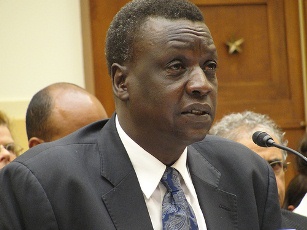Abyei joint committee appeals for increased humanitarian aid
By Ngor Arol Garang
February 7, 2012 (JUBA) – The Abyei Joint Oversight Committee (AJOC) has called on humanitarian organisations to urgently respond to the deteriorating humanitarian situation among those displaced from the contested area in mid-2011 when north Sudan’s military took control of the area by force.

The oil producing region remains an emotive issue. South Sudan, which seceded in July last year says that Abyei will become part of the new nation if residents are allowed to vote.
But Khartoum demands that a nomadic ethnic group, who would be expected to opt for Abyei to remain north of the new international border, are also allowed to vote.
Pagan Amum, the Secretary General of the South Sudan’s ruling Sudan People’s Liberation Movement (SPLM) on Tuesday said his country will not return the two countries to all out conflict but said that it will not allow even “a single inch” of its territorial boundaries to be taken by the Khartoum-based government.
Demarcating the North-South border is one of many issues under negotiation between the two sides.
Speaking at a humanitarian briefing on Monday in Juba, Luka Biong Deng, a co-chair of the Abyei Joint Oversight committee and an influential southern politician who comes from the region described the humanitarian situation on the ground as “very bad”.
A joint appeal for the Abyei displaced, seen by Sudan Tribune, bears signatures of Alkheir Alfaheem AlMaki, a representative of Sudanese government as well as Biongrepresentative of the Republic of South Sudan.
The Appeal also carries signatures of Lieutenant General, Tadesee Tesfay, Force Commander of United Nations Interim Force in Abyei and Boitshoko Mokgatlhe, facilitator to Abyei Joint Over Oversight Committee on behalf of the African Union as witnesses.
Biong briefed heads of the humanitarian agencies in a special meeting convened to explore ways to engage the two countries to respond to calls to facilitate voluntary return of the displaced to their ancestral homes without fear of insecurity.
After the Sudanese Armed Forces took control of Abyei in May last year, Biong was the first southern official from the area, to quit his ministerial portfolio.
He said the people of Abyei – mainly the Dinka Ngok ethnic group – were fully determined to return but that would need commitment of the two governments to provide to security.
Biong called on two governments and the humanitarian agencies to urgently facilitate the transition from humanitarian assistance to recovery, sustainable settlement and self sustaining development.
The senior official called on the two governments and the partners to identify and meet the immediate needs of the Misseriya and other nomadic communities, both in areas of residence and in the transitional zone of their seasonal migration in search for water and pastures for their livestock.
The ex-minister told the conference that he was impressed by the way his northern counterpart was showing concerns and a spirit of willingness to resolve the dispute between the two countries over the area.
He said the security situation in the area had improved as a result of the deployment of Ethiopian forces as part of the United Nations Interim Security Force in Abyei Area (UNISFA), which replaced the UN Mission in Sudan when it’s mandate was not extended after South Sudan independence.
“The security situation at the moment is relatively peaceful though the members of the Sudan Armed forces remain in the area but they are contained. We took a tour of the area”, Biong said while briefing the heads of the different humanitarian organisations on Monday.
Biong said there are currently no members of South Sudan’s army (SPLA) in Abyei town but said that there are 350 members of the Sudan Armed forces. He also said there are about 6,400 civilians from the Misseriya tribe who moved into the area with about 700,000 heads of cattle after the Sudanese army took control of the town last year.
Edward Lino Wuor Abyei, a former Abyei chief administrator, while contributing to the briefing said he had always advised the Missiriya to know where their interest lies instead of allowing others to use them against it.
South Sudan says it will grant the Misseriya access to the traditional grazing land in Abyei even if it becomes part of South Sudan.
“We went to Abyei and we saw what is there by ourselves. There is nothing there. The town remains in ashes”, Wuor said explaining that some of the Missiriya members have started talking to United Nations Interim Security Forces in Abyei about the need to reconcile.
“They have started coming forward to talk about what they have done. This is one of the positive indications that they are ready to resolve issues although we cannot resolve all of them during our life time”, he said.
The chairman of the South Sudan’s ruling party in the area explained there used to be an annual peace conference between Missiriya and the neighboring communities in the past until 1976 when the last conference was held at Abiemnom locality in the present day Unity State.
He identified and numerated some of the issues which the humanitarian communities should give immediate attention such as water, shelter, food and health services as well as renovation of the schools for the returning children.
Speaking at the same briefing, Lise Grande, the UN’s humanitarian coordinator for South Sudan, pledged the readiness of humanitarian agencies to move to the area but that they have had difficulties getting access since November 2011.
“We have been packed since November. All we need is access to the area. Security clearance has constrained our response”, the country’s top humanitarian official told the gathering. Grande added humanitarian organisations operate on a principle of impartiality.
The UN official said some international staff members from different UN agencies from Khartoum have already been deployed to Abyei but that they are also still experiencing difficulties in accessing some areas. Some participants also voiced their concerns over visas and access.
(ST)
